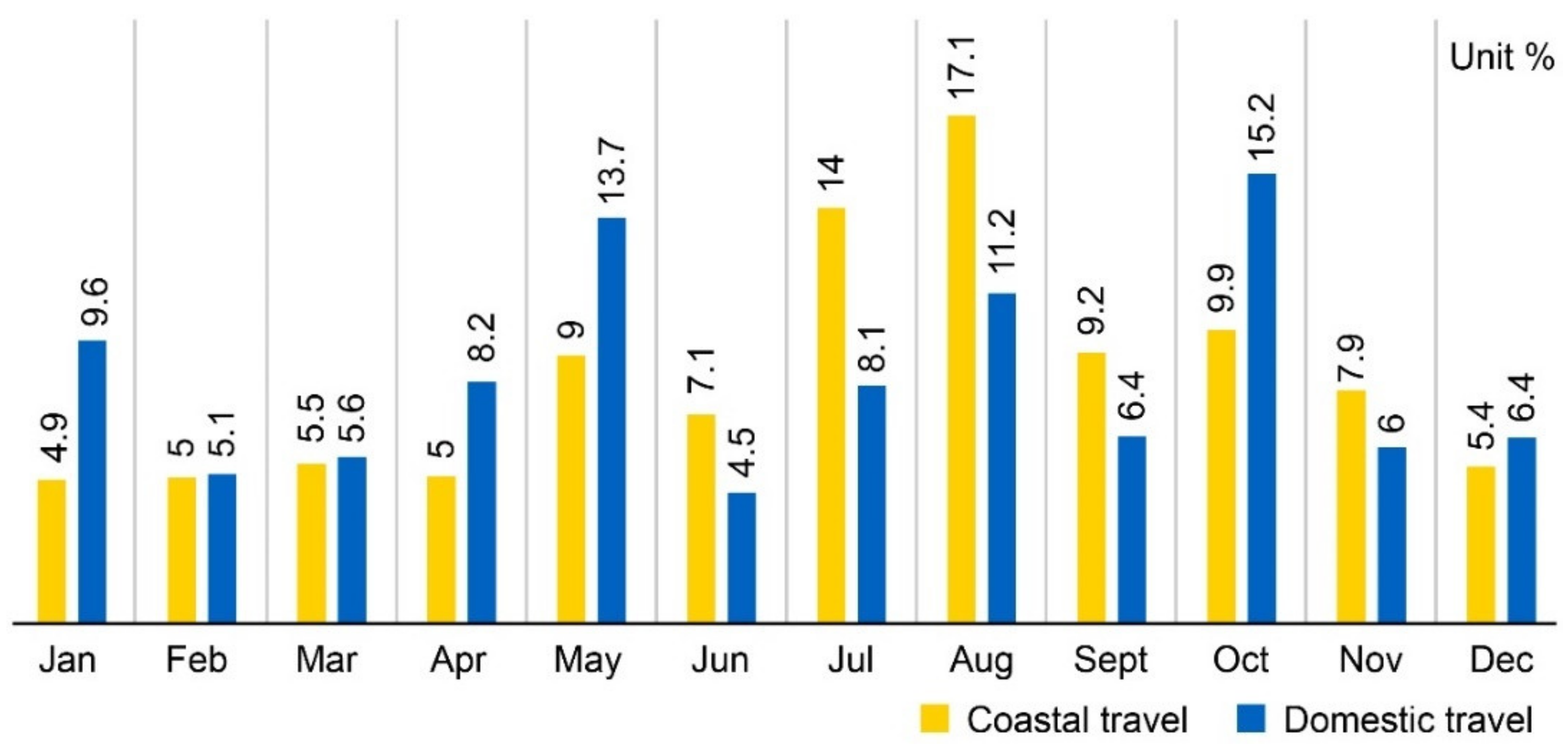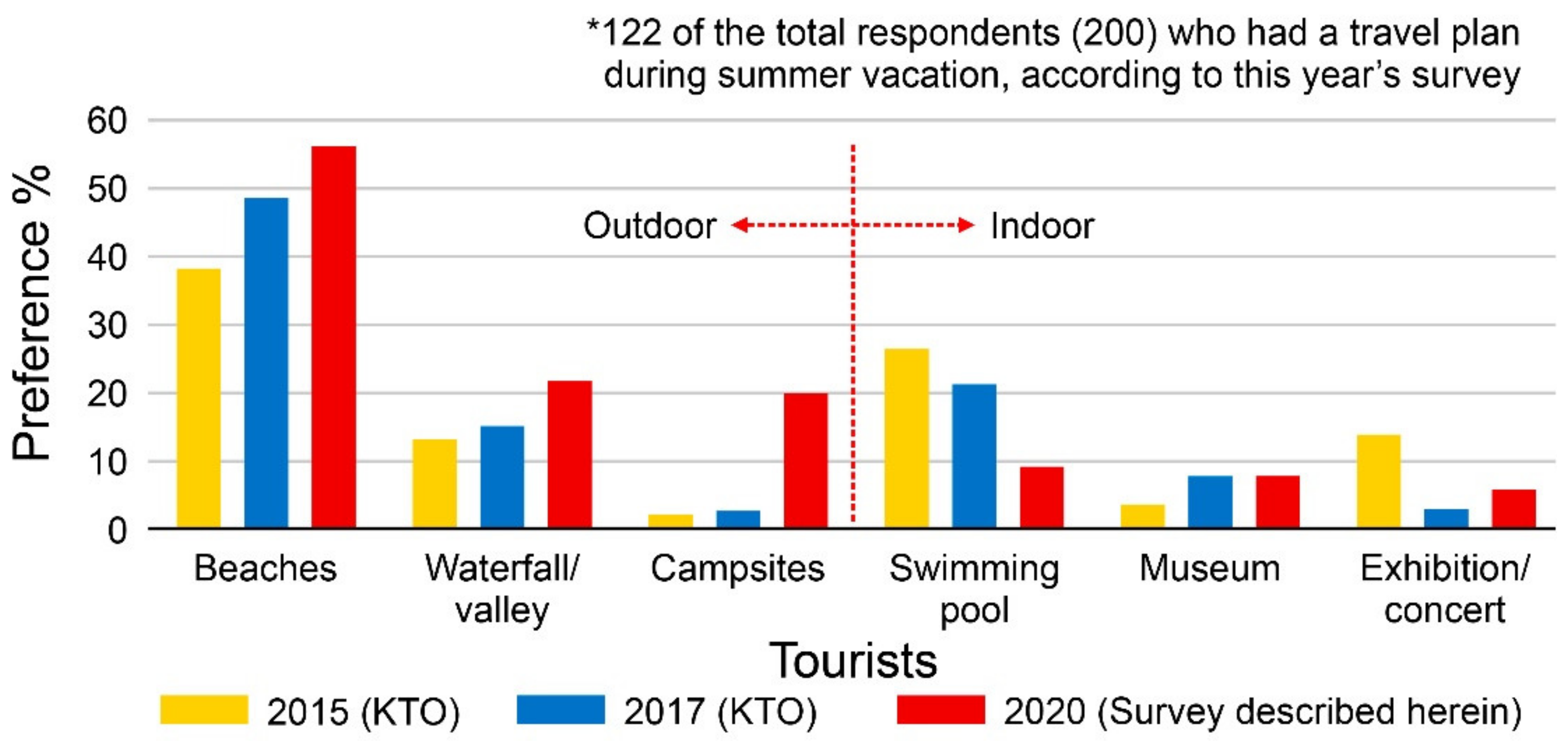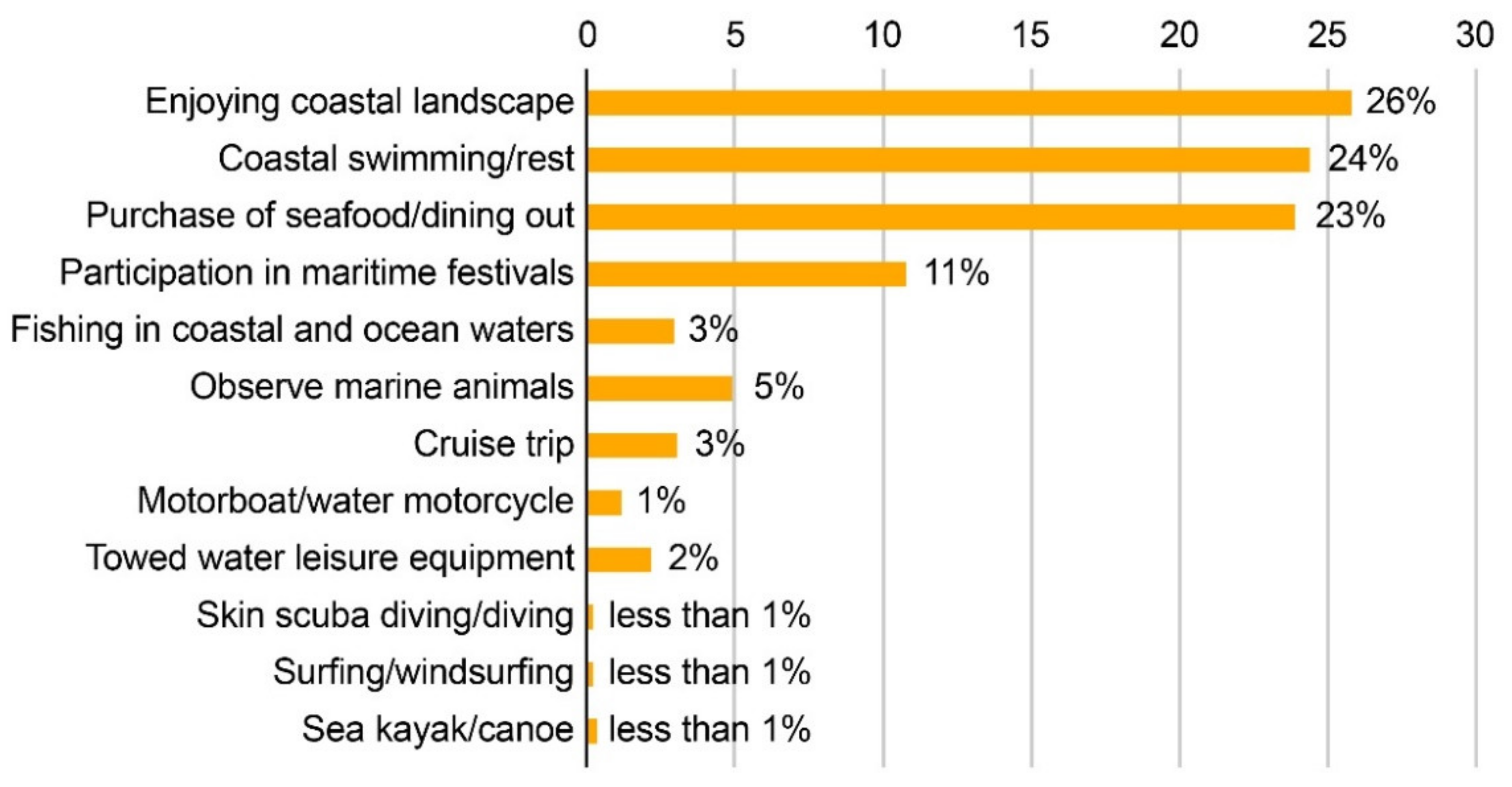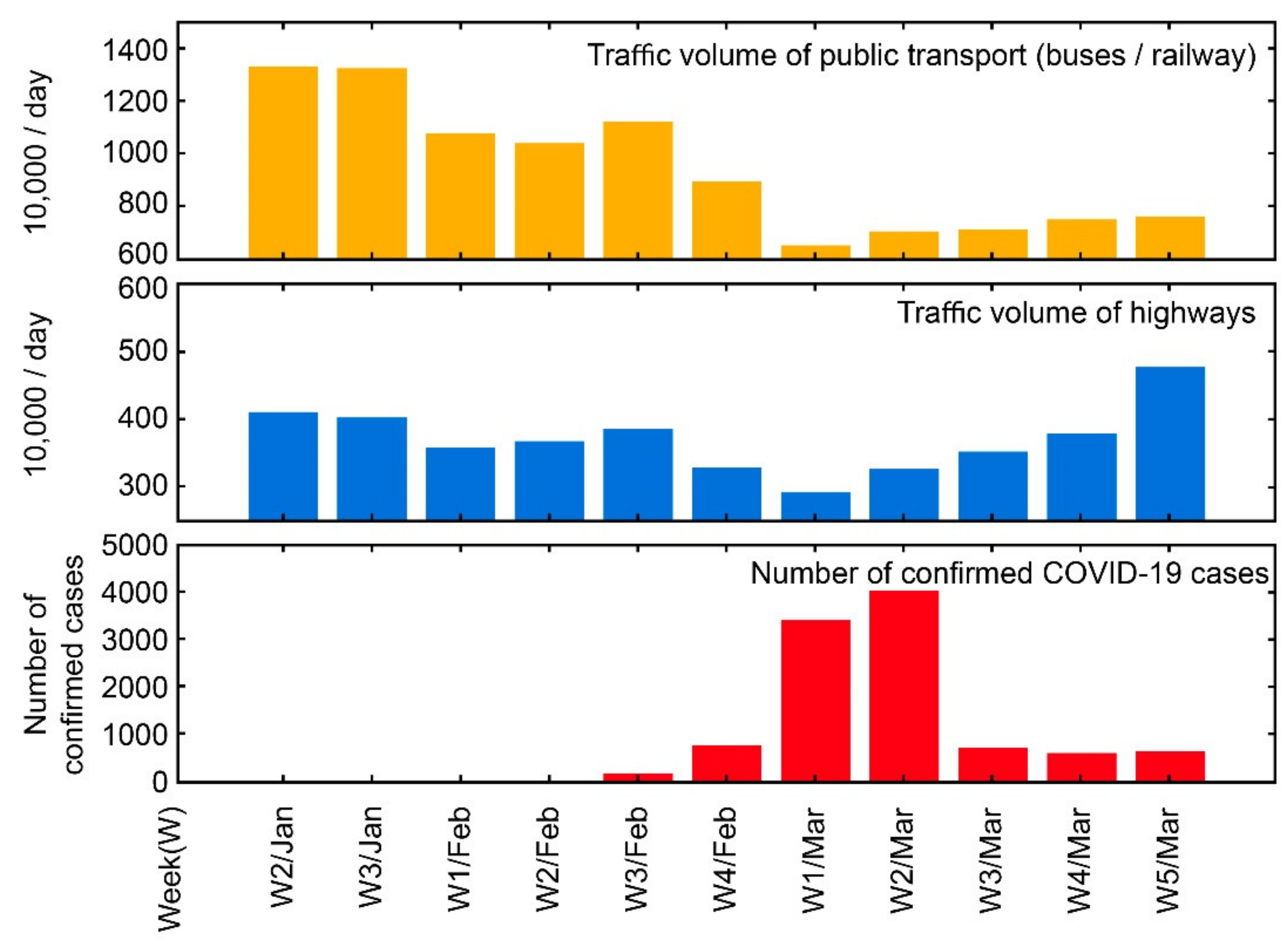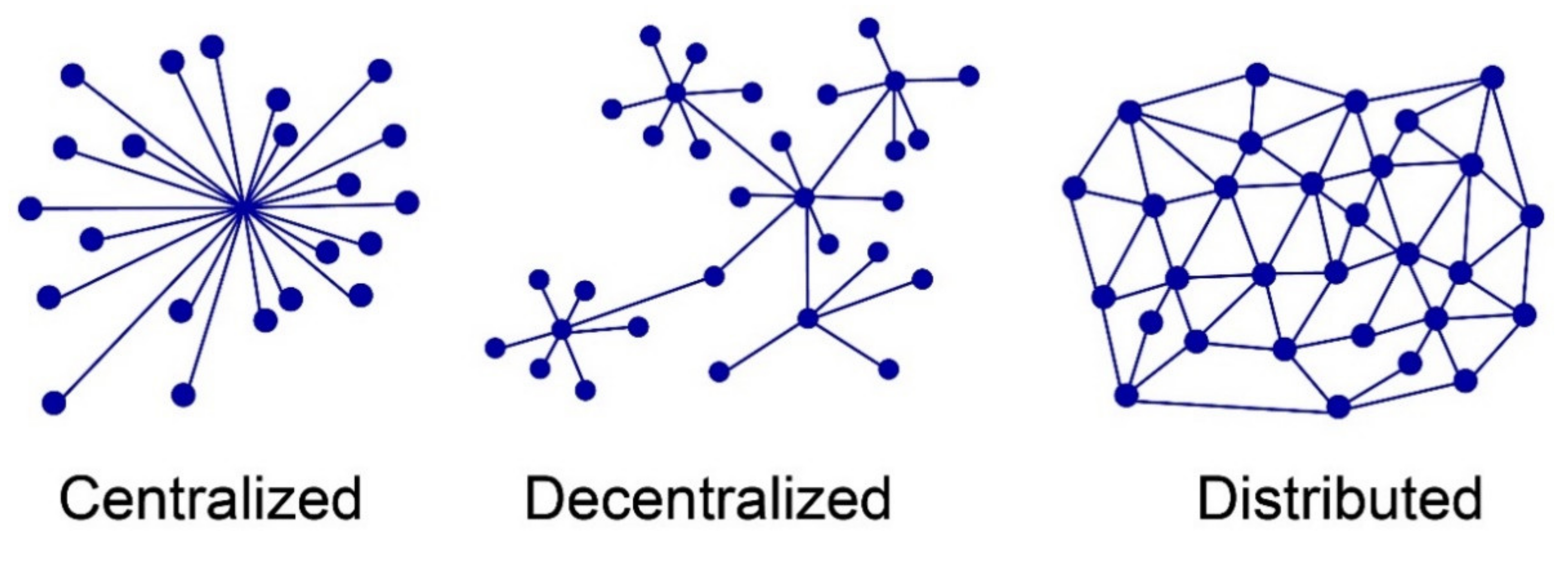Abstract
The COVID-19 outbreak has restricted international travel, halting tourism globally. Thus, travel demand has shifted from international to domestic destinations. The prolonged travel restriction has changed travel trends and travelers’ behaviors, adversely affecting the tourism industry worldwide. This study attempted to understand and examine the changes in travel preferences, such as choice of destinations, activities, and transportation modes, following the COVID-19 outbreak. This study used primary survey data of 200 respondents collected in June 2020 and secondary survey data collected by the Korea Tourism Organization in 2015 and 2017. The study also examined the role of the government in supporting strategies to prepare for the post-COVID tourism landscape. The analysis showed that the pandemic has caused travelers to favor short-haul destinations where non-contact (socially distanced) travel is possible. The study also found that the distributed land strategy that can make “untact” tourism a possibility could boost the struggling tourism industry.
1. Introduction
Over the last half-century, air travel has become less expensive with globalization, and, consequently, global tourism has grown rapidly [1]. According to the United Nations World Tourism Organization, the number of international tourists is expected to soar sharply by 2030, and this will provide momentum for tourist destination development in many coastal cities around the world [2]. In developing countries, tourism infrastructure development largely occurs by building hotels, airports, roads, and shopping malls in tourist destinations with beautiful coastal environments and tropical climates, thus promoting economic growth. These developments have helped local economies, small and medium businesses, and job creation in many countries.
However, global warming caused by climate change has raised the global sea levels, increased the frequency of natural disasters, such as floods and hurricanes, and posed a growing threat to the lives and property of people living in coastal areas [3]. Accordingly, sustainability has emerged as a necessary strategy for coastal tourism management to minimize the physical environmental impact of development activities and generate income for local communities and economies [4,5,6,7,8,9,10]. Similarly, the sharing economy has been incorporated into tourism as a new form of service, thus contributing to the tourism industry growth in recent years. The sharing economy or peer-to-peer economy refers to economic activities conducted under the concept of sharing seldomly used goods and services, including houses and cars, that individuals can own and rent out to others in need. It is widely adopted as an alternative approach to environmental protection and plays a significant role in expanding the tourism goods and service industries, improving accessibility, and providing income generation opportunities. In particular, it has helped low-income markets attempting to leverage tourism for development impacts [11]. The most popular sharing economy platforms, Airbnb and Uber, help find accommodation and access transportation, respectively, making it easier, convenient, and affordable for tourists worldwide. According to the World Bank, peer-to-peer accommodation (e.g., Airbnb) accounts for approximately 7% (around 8 million beds) of global accommodation and is expected to increase to at least 31% by 2025 [11].
Increased leisure time and improved economic conditions have allowed people to travel and expand their tourism activities at an unprecedented rate. With increasing prospects of new leisure and tourism activities, the tourism market grows further domestically and abroad. In line with an expanding variety of tourism activities, the demand for coastal recreational activities has grown in the travel industry in Korea. According to a survey conducted by the Korea Maritime Institute [12], the average number of visits by Koreans to coastal tourist attractions was 4.33 times per year. The total annual number of visits to coastal tourist attractions, when calculated by multiplying the total number of visits in each region by the weight parameter, was 157.5 million. The survey also found that Koreans’ total tourism consumption for domestic travel was estimated at KRW 23.34 trillion per year. Based on the estimated expenditure share spent on domestic coastal travel, the impact of coastal tourism on GDP was estimated at KRW 42.2 trillion annually, and the value added by coastal tourism was estimated at KRW 16.6 trillion. The most recent estimates are unavailable, but the impact of coastal tourism was expected to increase as the tourism industry continued to grow until the outbreak of COVID-19.
As of January 2020, COVID-19 spread worldwide and was officially declared a global pandemic by the World Health Organization. The number of COVID-19-related deaths and infections has been rising exponentially, and countries have been implementing travel bans, quarantines, and curfews. The health systems of most countries have been under extreme stress, and the collective aim is to flatten the COVID-19 curve [13]. Consequently, the COVID-19 outbreak has restricted outbound travel and led to a sharp decline in the number of international tourists, including from Korea. When a pandemic occurs, it negatively affects international tourism, as pandemics are statistically negatively correlated with international tourists [13,14].
In this study, we examined how the COVID-19 pandemic has affected domestic tourism in Korea, particularly coastal tourism, and explored potential strategies for developing coastal tourism for a post-COVID-19 scenario based on coastal engineering and urban planning perspectives. The study focused on the case of Korean coastal tourism, given the Korean government’s unusual emphasis on the “untact” economy since the outbreak of COVID-19. “Untact” is a new term coined by combining English language elements—the prefix “un” and the word “contact”—to refer to the Korean version of social distancing. The term, one of the high-trending buzzwords in Korea, became popular during the COVID-19 travel restrictions to define the significant change in people’s unwillingness to be in contact with others (i.e., contact-free society) due to infections [15]. This study proposes development strategies for untact coastal tourist attractions in Korea in terms of tourist attraction development and urban planning.
2. Background
In the wake of the COVID-19 pandemic, the profits of the travel and tourism industry have plummeted because more than 200 countries banned all non-essential travel, and individuals have restrained their mobility because of the risk of infection. As a result, domestic tourism has become the largest segment of the tourism industry in most countries because of the lack of international tourists, and key consumer groups in the local tourism industry have changed. Before the outbreak of COVID-19, sustainability and globalization constituted the main motivation for developing coastal tourism and destinations. However, such drivers appear to be less associated with the characteristics of the newly created needs of tourists amid the COVID-19 crisis. Hence, this section discusses new domestic travel trends and tourist demand features of post-COVID-19 coastal tourism in Korea, such as new travel behaviors, preferences, and characteristics.
2.1. Coastal Tourism after the COVID-19 Outbreak
Tourism is one of the fastest-growing industries in the world. In Korea, coastal tourism is an important sector, vital for the prosperity of coastal communities; it comprised nearly 40% of the overall Korean tourism market in 2020. In addition, the global tourism industry and associated economic activities have accounted for 9.8% of the total global GDP each year and created 275 million jobs globally [16].
However, given the risk of mass infection from COVID-19, local coastal tourism and associated cultures worldwide, including in Korea, need to change to prepare for post-COVID-19 recovery. Korea is a peninsula bounded by the sea on three sides and has 270 beaches designated by the Ministry of Oceans and Fisheries [16]. Among them, beaches in Busan attract 45% of the total number of tourists visiting beaches, and Haeundae Beach is the most crowded, with 14.5 million tourists having visited it in 2019 [16]. The remaining beaches are scattered across the country, including 92 in Gangwon, 54 in Jeonnam, 33 in Chungnam, 25 in Gyeongbuk, and 24 in Gyeongnam; nevertheless, tourists are concentrated in specific famous beaches, such as Haeundae in Busan and Gyeongpodae in Gangwon Province [17]. These numbers suggest that beaches are among the preferred destinations of Korean tourists, thus making them high-density areas. This preference means that coastal destinations pose a risk in the event of infectious disease outbreaks, such as COVID-19.
The annual number of tourists visiting coastal destinations has steadily increased from 75 million in 2012 to more than 100 million in 2019 [18]. The increased number of visits has negatively affected many coastal areas, creating problems, such as congestion, disorder, and litter. These impacts are currently coupled with the COVID-19 pandemic; thus, people and the natural environment both face increased vulnerability. Untact tourism could be a solution both for pandemic and environmental protection considering the overcrowded beaches and the possibility of further destruction of the coastal ecosystems under the current circumstances. Untact tourism can enable greater dispersal of tourists across beaches nationwide.
A total of 1.1 billion visits to coastal tourist attractions worldwide is currently estimated, and this number is expected to increase to 1.8 billion by 2030 [2]. When combined with maritime tourism, such as leisure activities at coastal resorts, cruise tours, and water sports, coastal tourism is considered a growing trend and a “blue ocean.” In this context, “blue ocean” refers to an unexplored new market area with no or few competitors. As a peninsula, Korea has coastal environments that provide multifold resources, such as tidal channels. Thus, coastal tourism has great potential in Korea. However, it has not thrived by global standards because of its weak industry structure, lack of resource connection and differentiation, and insufficient support systems [12]. Developing coastal tourism environments safe from the COVID-19 pandemic is an opportunity to revive the local coastal tourism industry amidst the stagnation of global tourism following the COVID-19 outbreak.
2.2. New Tourism Trends and Tourists’ Characteristics
The number of outbound travelers sharply dropped in February 2020 and has been decreasing by approximately 90% every month since March 2020 [19]. However, the Busan Tourism Organization (BTO) [20] reported in September 2020 an increase in domestic tourism in Busan during the vacation season. The BTO collected data during the summer vacation season and aggregated the number of tourists visiting Busan city. The data revealed a 0.3% YoY (year-over-year comparison to the same period of the previous year) increase, which reflects the tendency to avert the risk of COVID-19 infection and to follow government restrictions. Among these visitors, YoY increased by 4.3% for tourists from Seoul, the capital city and one of the farthest from Busan. Although Busan is the second-largest city in Korea, it has a relatively lower population density than Seoul and has many of the nation’s famous beaches. Therefore, this increase implies that many people sought relatively less densely populated destinations during the COVID-19 pandemic to minimize contact with others. Similarly, according to Airbnb, reservations for suburban houses outpaced those of urban houses since many people are traveling to less densely populated destinations because of the pandemic. The above trends signify that people are quickly adapting to the new reality and changing their travel behaviors accordingly.
According to the same report from the BTO [20], short-haul tourists have also increased in number because they prefer to drive their own cars and have day trips requiring no accommodation. After the outbreak of COVID-19, more people favor driving shorter distances for travel [21]. In overseas cases, inbound tourist arrivals at popular destinations, such as Barcelona, Berlin, and Florence, have significantly decreased, while popular domestic destinations for locals, such as Belfast, Nice, and Orlando, have seen an increase in tourist arrivals. Therefore, this preference for traveling shorter distances during the pandemic is a global phenomenon.
These findings indicate that visits to populated and well-known beaches have decreased after the outbreak of COVID-19, whereas visits to underpopulated beaches have relatively increased. This phenomenon is attributable to tourists’ increasing preference for non-contact (i.e., socially distanced) travel during the pandemic. This was not only because of the travel restrictions but also because of changing travel preferences due to the risk of coronavirus infection.
Consequently, such findings have revealed that the current trend of tourism reshaped by COVID-19 is characterized by untact and short-distance travel. For example, after the COVID-19 outbreak, people preferred to visit a small and quiet park near their home over a densely crowded and famous park that is far away. These changes are likened to the concept of the distributed economy (DE) and underline the importance of developing tourism across many destinations rather than concentrating it on specific destinations.
The changes after the COVID-19 outbreak may not represent a definitive, permanent, and universal trend of tourism in every country; however, our global economies and societies cannot handle another global pandemic crisis like COVID-19. Thus, dispersing the flow of tourists to a wider range of tourist attractions as part of strategies for reviving the stagnant tourism industry in the post-pandemic era is necessary.
3. The Untact Coastal Tourism
As mentioned previously, tourism development considerably boosts local economies and communities directly or indirectly through job creation, better sales performance in the business sector, foreign exchange earnings, and more [22]. However, international tourism is currently experiencing severe setbacks due to COVID-19; the global pandemic has particularly affected accommodation and foodservice business markets.
According to the following definitions, key components of tourism include accommodation, food service, and leisure and relaxation activity services. The World Tourism Organization refers to tourism as the activities of visitors staying at a destination outside of their usual environment for specific purposes, such as leisure and business [2]. Macintosh and Goeldner defined tourism as a collection of industries that deliver a travel experience comprising various services, including transportation, accommodation, eating and drinking establishments, retail stores, and entertainment businesses [23]. However, accommodation, food services, and leisure and relaxation activity service sectors were hit hardest by the pandemic, triggering an economic downturn in the tourism industry. As previously discussed, the number of trips of domestic travelers has not changed significantly since the demand for international trips shifted to local destinations. However, overall, tourism-related industries, such as hotels and restaurants, were economically damaged because people used accommodation and food services less often in destination areas because of the risk of COVID-19.
The local tourism industry’s economic downturn may be attributed to the following two factors. First, travel demand declined in line with a nationwide COVID-19 lockdown. Second, people’s spatial perception of sharing is changing. To prevent the spread of COVID-19, the government has taken extraordinary measures, including social distancing, quarantine on arrival, and restrictions to restaurants’ working hours. These measures have critically damaged accommodation and foodservice businesses. A drastic decrease in inbound foreign tourists amid stringent immigration restrictions has caused hotels and other accommodation providers in Seoul to fall into a recession. Meanwhile, restricting working hours in restaurants, cafés, and bar businesses has resulted in a decline in revenue in the foodservice industry. In addition, closing tourist facilities, such as museums and art galleries, has had an indirect negative impact on the local economy. However, these measures can be considered temporary.
Conversely, people’s changed perceptions of spatial preferences could have a lasting impact on the tourism industry even after the pandemic. Richter asserted that traveling is the leading cause of infectious diseases and is fatal to public health [24,25]. People avoid crowded places and do not want to share things with others anymore. Furthermore, they neither visit heavily populated beaches nor line up outside to dine at popular restaurants. According to our online survey, after the COVID-19 outbreak, the preferred type of accommodation has been family or friends’ homes, and the number of tourists who stayed at least one night decreased by about 15% on a YoY basis. While traveling, tourists also preferred delivery and takeout from local restaurants and ready-to-eat food for their meals as they were reluctant to visit restaurants. Thus, face-to-face contact has become a key concern among travelers when considering travel destinations. Accordingly, this study examined changes in the tourism market and analyzed the need for non-contact coastal tourism as an alternative.
3.1. Changes in Korea’s Local Tourism Market
Travel demand has grown continuously in Korea. In particular, coastal tourism has become more accessible through public transit and expanded in metropolitan areas. Increased demand for experience-based tourism is expected to improve the quality of tourist experience in coastal destinations. The quality of tourist experience in coastal tourism rose steadily from 80% in 2015 to 82.7% and 86% in the following two years, respectively, showing an increase in the range of 2.7–3.3% [16]. Leisure tourism in coastal areas peaked in the summer, accounting for 17.1% of the total tourists visiting coastal destinations in August, followed by July in 2017 (Figure 1).
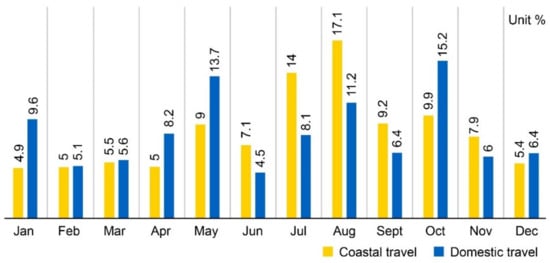
Figure 1.
The monthly proportion of travels in Korea in 2017 (Data source: Choi et al., 2019).
As illustrated in Figure 1, due to the positive relationship between tourist behavior and the summer vacation season, the demand for coastal tourism sharply increases in July and August as a seasonal phenomenon. Regarding coastal destinations, tourist visits to Gangwon Province were the highest at 38.8%, followed by Busan (37.4%) and South Gyeongsang Province/Ulsan (26.6%). In terms of tourism purposes, leisure/relaxation was the highest (48.5%), followed by food experiences and marine recreational activities (9.4%).
The local coastal tourism industry is experiencing a severe setback similar to that of the global tourism industry, while COVID-19-spurred issues, such as economic downturn, social anxiety, and social distancing, are negatively affecting the industry. Nevertheless, some industries have rapidly adapted to changes during the pandemic by accommodating the emerging untact culture, which includes watching movies using streaming services online instead of going to a movie theater, ordering food from restaurants instead of eating out with family, or having virtual conferences instead of face-to-face meetings. Therefore, the coastal tourism industry also needs to adapt to unprecedented structural and cultural changes caused by COVID-19.
The main purpose of visiting coastal areas is for vacation and rest amid the growing trend of seeking work-life balance. In other words, visiting crowded beaches is not simply a routine outing during the summer holiday season or for the mere enjoyment of marine recreation. As mentioned earlier, the distribution of coastal tourists, particularly in summer, is heavily skewed toward specific beaches, such as Gyeongpodae Beach in Gangwon Province or Haeundae Beach in Busan. This seems largely associated with the fact that less popular beaches lack public cultural features that appeal to tourists.
This study conducted a survey of 200 respondents from Korea to understand the impact of the COVID-19 outbreak. The survey asked about their vacation activities in summer 2020 and compared the findings with those of the surveys conducted in 2015 and 2017 by the Korea Tourism Organization, as shown in Figure 2. In collaboration with SK Telecom (Korea’s largest wireless telecommunications operator), the Korea Tourism Organization analyzed popular tourist destinations during the summer vacations (July–August) by regional governments based on the search volume of the smartphone-based navigation “T-map” for the year 2015 and 2017. In 2015, among 235,169 users, a total of 129,416 preferred outdoor facilities, including 91,232 at beaches, 31,844 at waterfalls/valleys, and 6340 at campsites. In 2017, due to the increase in T-map users, 321,865 people were counted, with a total of 216,644 outdoors, 156,760 at the beach, 50,492 at a waterfall/valley, and 9392 at campsites. By comparing the preferences of 2015 and 2017, the number of people preferring beaches increased by about 10%, from 38.8% to 48.7%. Since the demographic of the T-map users was not specified except for their age distribution, it was not possible to compare them qualitatively; however, a survey was conducted herein according to the age distribution of T-map users with 200 people nationwide.
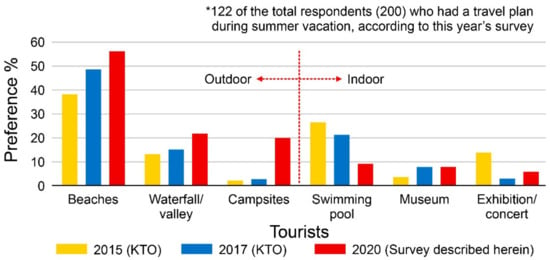
Figure 2.
Comparison of vacation activities before and after COVID-19.
The survey data were collected through an online survey, and 45 respondents were between the ages of 20–29, 43 respondents between the ages of 30–39, 44 respondents between the ages of 40–49, 45 respondents between the ages of 50–59, and 23 respondents aged 60 or above. The survey was conducted over two weeks between 1 June and 16 June 2020, before the start of the summer vacation season; during this period, the total cases of COVID-19 in South Korea significantly increased from 11,541 to 12,198.
Korea is one of the few countries where lockdown was implemented efficiently, and compliance was extremely high. Therefore, the study assumed that the impact of COVID-19 on tourism behavior would be significant. Furthermore, Korea has an unusual terrain. A large population is concentrated in a small territory, and it is surrounded by the sea on three sides with 69 easily accessible coasts.
According to the survey results, 73 respondents (32%) preferred to visit a beach accessible through public transport before the pandemic began. Gyeongpodae Beach in Gangwon Province and Haeundae Beach in Busan belong to this category. However, 51 respondents prioritized the enjoyment of the coastal landscape as their travel purpose rather than beach visits using public transport after the COVID-19 outbreak. According to a public awareness survey conducted in 2018 [16], the most popular activity among tourists visiting coastal areas was “enjoying the beauty of the coastal landscape” (26%), as shown in Figure 3. Hence, if tourists can enjoy natural landscapes in any coastal area, including less popular beaches, greater regional dispersal of tourists can be achieved by using new strategies.
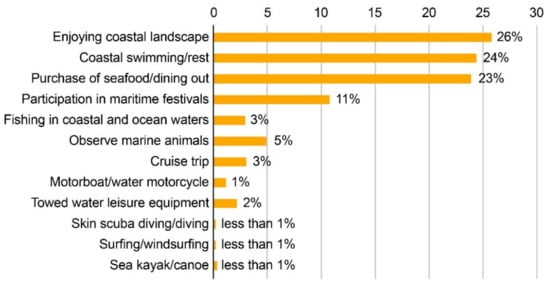
Figure 3.
Main purposes for visiting coastal areas (Data source: Choi et al., 2019).
3.2. Need of Untact Development for Coastal Tourism
Since the COVID-19 outbreak, individuals in South Korea have preferred using their own vehicle as a daily transportation method, indicating a shift from the use of public transport, which they preferred in the pre-pandemic era [19]. This change is further illustrated in Figure 4, which presents the traffic volume of public transport and highways in early 2020 and the number of confirmed COVID-19 cases at different points in time. After the pandemic began, urban railway usage significantly reduced, whereas highway tourist traffic volume increased, implying an increased use of private vehicles. Correspondingly, the number of travelers who drive their own vehicles for vacation trips is assumed to have increased in July and August. However, data in this regard is limited.
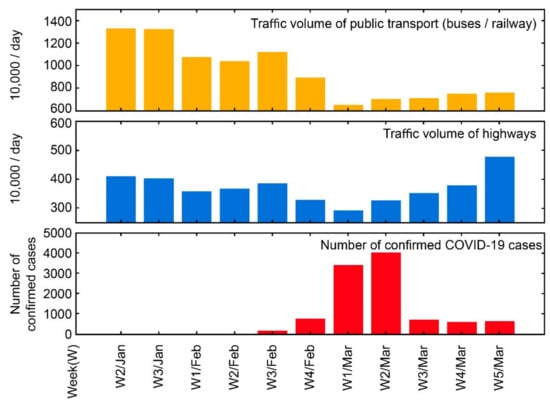
Figure 4.
Relationship between transport mode and COVID-19 cases (Data source: Road Traffic Authority of Korea).
While many small beaches around the country are difficult to visit because of the lack of an expansive public transportation network, the results shown in Figure 4 indicate that an increased preference for using one’s vehicle can improve the accessibility and use of these small beaches and thus attract tourists. Eventually, this trend will disperse coastal tourists nationwide beyond the easily accessible and most populated beaches, such as Gyeongpodae and Haeundae. The increased use of private vehicles for coastal tourism also indicated the need to develop tourist products designed for self-driving and untact trends for the future growth of the coastal tourism industry.
Less popular beaches need to be developed as unique untact tourist attractions to disperse tourists further across coastal areas and stimulate untact tourism culture. Eventually, these beaches will become competitive in the post-COVID-19 era to meet the demands of tourists and offer untact tourism, setting a new tourism trend that provides safe places to rest in coastal areas and enables a new tourism culture. This study aimed to improve the understanding of the infrastructure development strategy required to initiate untact coastal tourism to propose directions for future growth in the coastal tourism industry.
4. Discussion: Coastal Tourism Development Strategy for the Post-COVID-19 Era
In the post-pandemic era, the role of the government and solutions born of NIMBY (Not in My Back Yard) (NIMBY: Those who usually advocate for new development, nonetheless, oppose any development plan if it takes place near their houses or disrupts their lives.) attitudes will be important to revive the tourism industry, and central and local governments will play a particularly important role in developing untact coastal attractions. As discussed above, this study identified untact and short distances as key factors in developing the coastal tourism ecosystem for a post-COVID-19 era. Specifically, development should be preceded by the government’s commitment to providing tourists with spatial safety precautions, supported by greater regional dispersal of tourists through the development of untact coastal destinations, albeit on a small scale, and improved transport infrastructure, whereby tourists are encouraged to drive their own vehicles, instead of using public transportation to reduce the risk of COVID-19 infection. The government should assume many roles and responsibilities to revive the coastal tourism industry; however, their main goal should be to disperse tourists nationwide. Therefore, this study proposed an urban planning and development strategy that could help the coastal tourism industry recover. It focused on introducing a coastal tourist destination development strategy to respond to the new travel behaviors, which favor untact tourism and short-distance travel. Nonetheless, the COVID-19 crisis could be an opportunity to redesign our tourism industry, including coastal tourism, and be more environmental-friendly and sustainable [26].
Coastal tourism development generally involves developing fundamental tourist infrastructures, such as airports and roads, by the public sector, while the private sector takes part in constructing tourism facilities, such as hotels and resorts. In this context, the government plays a collaborative role in defining land development under integrated coastal management schemes, regulating development practices to prevent sprawl, and attracting private investment through coordination between locals and developers. The government’s strategies to prevent sprawl and attract private investment will allow dispersing geographically coastal tourism developments.
Dispersed coastal attraction development is based on the concept of DEs and their value. The DE concept is somewhat different from agglomeration economies and sharing economies in terms of providing high-quality goods and services for few groups to maximize their utility and happiness; thus, in this study, it was considered a highly practical strategy for post-COVID-19 coastal industry development in accordance with people’s new perception of public space or untact. Thus, understanding the role of government and the concept of DE as the basis for the development of untact tourism in coastal cities is important.
4.1. Distributed Economies for Untact Coastal Development
In Korea, coastal tourism has generally been developed in popular coastal destinations to boost local economies through land development by constructing hotels and other commercial buildings and expanding the public transportation infrastructure for easier accessibility. The destination’s local economy is further strengthened by the flow of tourists induced by regional attractions, such as gourmet restaurants and traditional markets. For example, in Busan, Haeundae Beach is characterized by its modern accommodation establishments, including hotels and residences available for tourists, which co-exist with high-rise residential apartments and commercial buildings. Its land development was designed to integrate locals and visitors into tourist attractions and has proven a successful business investment. However, such a tourist land development strategy has been used only when an area, such as Haeundae Beach, is highly feasible in terms of economic profitability.
It may be too early to determine whether the new traveling trends that emerged after the COVID-19 outbreak are permanent; given that COVID-19 induced new tourism trends and characteristics of domestic tourists, the previous development strategies of tourist destinations that seek economic feasibility may not be suitable to the post-pandemic world. Instead, adopting the concept of DE to disperse tourists to coastal areas across the country will allow for untact coastal tourism.
DE refers to an economic concept that favors shifting from conventional large-scale production to systematic and flexible small-scale industrial production, as the former’s ecosystem is not socioeconomically or environmentally sustainable [27,28]. As shown in Figure 5, the DE resembles an ecosystem in which the components are connected. This feature makes it an ideal strategy to guide the development of small-scale untact tourist attractions. Considering a real-world example, the strategy can be adopted to develop additional tourist attractions around a popular coastal destination, such as the Haeundae Beach, to disperse tourists rather than smaller, less popular beaches elsewhere. More importantly, a DE-based strategy needs to be adopted for reviving the sluggish coastal tourism ecosystem in tandem with the current policy and coastal tourism resources.
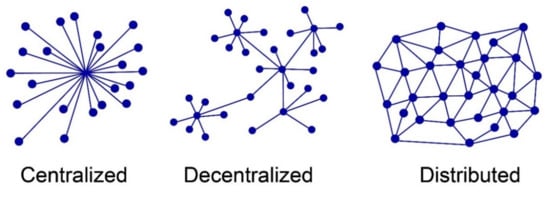
Figure 5.
Distributed economy ecosystems (Source: Van Den Dool et al., 2009).
4.2. Role of the Government in Untact Coastal Development
Concerning the role of local governments in developing untact coastal tourism destinations, this study suggests several governmental strategies. First, the local government should regulate land development effectively to prevent sprawl in coastal areas. According to Butler’s life cycle model, tourist areas are hypothetically developed in seven stages: exploration, involvement, development, consolidation, stagnation, decline, or rejuvenation. The government should be involved between stages 3 and 4 (development and consolidation, respectively) to prevent the developmental sprawl of the coastal destination and maintain the number of tourists at the proper level. In other words, while the government supports the development of tourist facilities and accommodation, they should regulate the development of hotels and resorts that large international companies often own.
Second, the central government must avoid development that is overly concentrated in a few places. Third, incentives must be provided for private investments, such as tax benefits and exclusive development rights. Small-scale coastal attractions being developed in various parts of the nation would struggle to attract private investment because of low economic feasibility. In addition to active infrastructure development and other forms of support, aggressive government incentives, such as tax benefits and exclusive development rights, are crucial to address this issue. Furthermore, public–private partnerships can be another effective development tool for the government. Finally, accommodating residents’ opinions and giving feedback are important to create a sustainable tourist destination. Such attempts will effectively disperse the flow of tourists nationwide, improve residents’ quality of life, and boost the local economy through community development.
Local governments need to assist in attracting private investment by minimizing obstacles to the planned development, such as NIMBY attitudes, to allow for the local competitive advantages to be used to the maximum extent [29]. Further, the local government needs to be responsible for establishing development plans and making decisions in favor of the interests of the public and private sectors.
4.3. Dispersal Strategies through Non-Contact Culture
The COVID-19 outbreak has forced pre-existing non-contact cultures to regain momentum, and various types of non-contact cultures have been newly introduced and adapted to Korean society. For example, drive-through stores, which originated in the US, allow consumers to place orders and pick up goods (e.g., food) in a car. The drive-through format represents one of the most common non-contact cultures and has been integrated into various sectors, including parking areas, bookstores, restaurants, and even the financial industry. The most significant advantage of the drive-through is that consumers can conveniently enjoy shopping the way they want to, without face-to-face contact. After the COVID-19 outbreak, the use of drive-throughs has increased in Korean society, including in open markets, fish markets, clinic centers, and resident service centers.
Drive-throughs can be adopted at less populated beaches in the form of specialty shops and gourmet restaurants in the respective areas. They can also be applied as drive-in venues for watching movies or enjoying the natural landscape. These unprecedented non-contact visitor attractions are expected to make untact tourism and tourist dispersal viable. Thus, drive-throughs or drive-ins can be used as an untact tourism strategy, tailored in accordance with visitor attractions at each of the less popular beaches. Consequently, the dispersal of tourists from densely populated beaches will be achieved. Furthermore, untact coastal tourism has the potential to become a popular cultural change, given its convenient and safe features.
5. Conclusions
The COVID-19 outbreak has significantly affected global economies and societies. The global tourism industry, including coastal tourism, has also been damaged, its brisk growth reversed. As international travel has been restricted since the global pandemic began, the demand for domestic trips has increased. As a result, the tourism industry has shifted to local destinations. Accordingly, the increased flow of local tourists makes popular coastal tourist attractions vulnerable to mass infections amid the COVID-19 pandemic. Thus, tourist dispersal is required imminently, particularly from highly populated beaches, to ensure safety regarding coronavirus; combining untact tourism and features of unpopular coastal areas is necessary to boost tourism in coastal areas safely.
The results of this study’s survey revealed that local tourists in Korea prefer untact and short-haul travel. Therefore, this study suggests strategies aimed at dispersing tourists by developing small-scale untact destinations based on the concept of DE. Untact coastal tourism is expected to provide tourists with a relatively safe environment to protect them against COVID-19 by dispersing them from popular beaches to more secluded ones, thus revitalizing tourism and local economies in the process. However, because of our limited number of samples in the online survey or specific case study in South Korea, primarily in Busan, the results may not be generalizable to the global coastal tourism and tourists’ characteristics after the COVID-19 outbreak. Nonetheless, the study results can significantly contribute to developing coastal tourism recovery strategies post-COVID-19.
As previously mentioned, many experts opine that our economies and societies cannot withstand another global pandemic. Therefore, the government needs to play a pivotal role in preventing intensive, sprawling development in specific coastal cities and, instead, attracting private investment for projects in areas that have been relatively ignored through incentives, such as tax benefits, to maximize the dispersal effects of tourism development.
Many dimensions of the changing tourism preferences during COVID-19 could not be incorporated in this study due to data limitations. A larger sample size is needed to understand and analyze changing travel trends better. In addition, we would like to create a dynamic panel data model to evaluate the trend on a year-to-year basis.
This study attempted to understand the changing travel behaviors of tourists after the outbreak of the COVID-19. The changed travel preferences directly affect the livelihood of millions of people who depend on the tourism industry in Korea as well as worldwide. This paper discussed a revival strategy that could not only help the Korean coastal tourism industry but may also be implemented in other similar regions in the world where tourism is one of the primary sources of income. The development strategy of the coastal tourism industry for the post-COVID-19 era is an important issue that may directly affect those living in the coastal cities. The threat of COVID-19 infection is concerning, and many countries have suffered multiple waves of the pandemic, suggesting that we may have to live with COVID-19 for a long time. This study suggests a new strategy for the coastal tourism industry to function successfully amid a global pandemic and even beyond.
Author Contributions
Conceptualization, J.-I.S. and H.-D.K.; Formal analysis, J.-I.S. and H.-J.K.; Investigation, J.-I.S., H.-D.K. and H.-J.K.; Methodology, J.-I.S. and A.A.; Supervision, A.A. and K.-H.K.; Validation, J.-I.S., H.-J.K., H.-D.K. and K.-H.K.; Writing—original draft, J.-I.S. and H.-D.K.; Writing—review & editing, A.A. and K.-H.K. All authors have read and agreed to the published version of the manuscript.
Funding
This research was partially supported by The World Association for Waterborne Transport Infrastructure, Korean National Section.
Institutional Review Board Statement
Not applicable.
Informed Consent Statement
Not applicable.
Data Availability Statement
Not applicable.
Acknowledgments
The authors wish to thank The World Association for Waterborne Transport Infrastructure, Korean National Section.
Conflicts of Interest
The authors declare no conflict of interest.
References
- Honey, M.; Krantz, D. Global Trends in Coastal Tourism; Center on Ecotourism and Sustainable Development: Washington, DC, USA, 2007. [Google Scholar]
- World Tourism Organization. Tourism towards 2030: Global overview. In Proceedings of the UNWTO 19th General Assembly, Madrid, Spain, 10 October 2011. [Google Scholar] [CrossRef]
- Kim, H.D.; Aoki, S.I. Artificial Intelligence Application on Sediment Transport. J. Mar. Sci. Eng. 2021, 9, 600. [Google Scholar] [CrossRef]
- Burke, L.; Kura, Y.; Revenga, C.; Spalding, M.; McAllister, D. Pilot Analysis of Global Ecosystems: Coastal Ecosystems; World Resources Institute: Washington, DC, USA, 2001. [Google Scholar]
- Dobson, S. Policy Directions for Coastal Tourism: Edited Proceedings from the Workshop; Simon Fraser University: Vancouver, BC, Canada, 2003. [Google Scholar]
- Garrod, B.; Wilson, J.C. Marine Ecotourism: Issues and Experiences; Channel View Publications: Clevedon, UK, 2003. [Google Scholar]
- Kline, J.D. Tourism and Natural Resource Management: A General Overview of Research and Issues; United States Department of Agriculture: Washington, DC, USA, 2001. [Google Scholar]
- Secretariat of the Convention on Biological Diversity. Guidelines on Biodiversity and Tourism Development; The Secretariat of the Convention on Biological Diversity: Montreal, QC, Canada, 2004. [Google Scholar]
- Yunis, E. Tourism in SIDS: A Key Factor for Economic, Social, and Environmental Sustainability; World Tourism Organization: Madrid, Spain, 2006. [Google Scholar]
- Ghosh, T. Coastal tourism: Opportunity and sustainability. J. Sustain. Dev. 2011, 4, 67. [Google Scholar] [CrossRef] [Green Version]
- Bakker, M.; Twining-Ward, L. Tourism and the Sharing Economy: Policy and Potential of Sustainable Peer-to-Peer Accommodation; World Bank: Washington, DC, USA, 2018; Available online: https://openknowledge.worldbank.org/handle/10986/30452 (accessed on 1 June 2020).
- Hong, J.W.; Jang, J.I.; Yoon, I.J.; Lee, J.A. A Study on Socioeconomic Ripple Effect and Indicator Development of Marine Leisure Tourism; Basic Research Report-2; Korea Maritime Institute: Busan, Korea, 2015. [Google Scholar]
- Karabulut, G.; Bilgin, M.H.; Demir, E.; Doker, A.C. How pandemics affect tourism: International evidence. Ann. Tour. Res. 2020, 84, 102991. [Google Scholar] [CrossRef]
- Fotiadis, A.; Polyzos, S.; Huan, T.C.T. The good, the bad and the ugly on COVID-19 tourism recovery. Ann. Tour. Res. 2021, 87, 103117. [Google Scholar] [CrossRef] [PubMed]
- Park, S.U.; Kwon, K.S. Forecasting Korean National Innovation System and Science & Technology Policy after the COVID-19. Asian J. Innov. Policy 2020, 9, 145–163. [Google Scholar]
- Choi, I.S.; Hong, J.W.; Lee, J.A.; Jang, J.I. A Study on Promotion of Marine Leisure Tourism Industry; Basic Research Report-7; Korea Maritime Institute: Busan, Korea, 2019. [Google Scholar]
- News1 Korea. Solving Environmental Problems of Beaches by Distributing Them Nationwide. 2018. Available online: https://www.news1.kr/articles/?3062840 (accessed on 30 May 2020).
- Hong, J.W.; Yoon, I.J.; Choi, I.S.; Lee, J.A. The Need for Domestic Beach Management and Change of Paradigm; Report No.38; Korea Maritime Institute: Busan, Korea, 2017. [Google Scholar]
- Lee, J.; Lee, J.; Jang, D.; Song, F.K.; Kim, J.; Lee, S.J. Korea Report of COVID-19 Responses; Korea Report No 2; Korea Transport Institute: Busan, Korea, 2020; Available online: https://english.koti.re.kr/component/file/ND_fileDownload.do?q_fileSn=107911&q_fileId=e8cf0db9-ecaf-4bc3-ae9b-c90c9478769d (accessed on 30 May 2020).
- Busan Tourism Organization. 2020 Big Data Analysis Results on Tourists Visiting Busan in Summer. 2020. Available online: https://bto.or.kr/kor/CMS/Board/Board.do?mCode=MN102&mode=view&mgr_seq=92&board_seq=1124 (accessed on 1 June 2020).
- Rice, W.L.; Mateer, T.J.; Reigner, N.; Newman, P.; Lawhon, B.; Taff, B.D. Changes in recreational behaviors of outdoor enthusiasts during the COVID-19 pandemic: Analysis across urban and rural communities. J. Urban. Ecol. 2020, 6, juaa020. [Google Scholar] [CrossRef]
- Khan, H.; Seng, C.F.; Cheong, W.K. Tourism multiplier effects on Singapore. Ann. Tour. Res. 1990, 17, 408–418. [Google Scholar] [CrossRef]
- Macintosh, R.W.; Goeldner, C. The Tourism Industry; Harper Press: New York, NY, USA, 1986. [Google Scholar]
- Richter, L.K. International tourism and its global public health consequences. J. Travel Res. 2003, 41, 340–347. [Google Scholar] [CrossRef]
- Qiu, R.T.R.; Park, J.; Li, S.; Song, H. Social costs of tourism during the COVID-19 pandemic. Ann. Tour. Res. 2020, 84, 102994. [Google Scholar] [CrossRef] [PubMed]
- Ioannides, D.; Gyimothy, S. The COVID-19 crisis as an opportunity for escaping the unsustainable global tourism path. Tour. Geogr. 2020, 22, 624–632. [Google Scholar] [CrossRef]
- Johansson, A.; Kisch, P.; Mirata, M. Distributed economies—A new engine for innovation. J. Clean Prod. 2005, 13, 971–979. [Google Scholar] [CrossRef]
- Van Den Dool, A.; Marchington, E.; Ripken, R.; Hsieh, A.; Petrasova, M.; Bilic, D.; Idrisova, A.; Pena, A.; Ashraf, V.; Capelán, N.; et al. The Future Is Distributed: A Vision of Sustainable Economies; The International Institute for Industrial Environmental Economics, Lund University: Lund, Sweden, 2009. [Google Scholar]
- Viegas, M.S. Community development and the south beach success story. Georg. J. Poverty Law Policy 2009, 12, 389. [Google Scholar]
Publisher’s Note: MDPI stays neutral with regard to jurisdictional claims in published maps and institutional affiliations. |
© 2021 by the authors. Licensee MDPI, Basel, Switzerland. This article is an open access article distributed under the terms and conditions of the Creative Commons Attribution (CC BY) license (https://creativecommons.org/licenses/by/4.0/).

